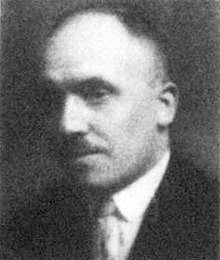Paul Schreck
Paul Schreck (born December 23, 1892 in Haardorf , Weißenfels district , province of Saxony , † September 10, 1948 in Heidelsheim , Bruchsal district , Württemberg-Baden ) was a German politician ( KPD ).
Live and act
Paul Schreck learned the lathe trade as a young man. Since 1910 he belonged to the German metal workers' association. After he had been a member of the Social Democratic Workers' Youth since 1908, Schreck joined the Social Democratic Party of Germany (SPD) in 1911 . In 1918, Schreck founded the Baden section of the Spartakusbund . In the same year he left the SPD and switched to the newly founded Communist Party of Germany (KPD).
During the Weimar Republic , Schreck became known to a broader public as a political mandate holder: from 1925 to 1928 he belonged to the Baden state parliament and from 1928 to 1932 as a member of the Berlin Reichstag for constituency 32 (Baden) . According to the handbook of the Reichstag, Schreck was sentenced to imprisonment four times during the Weimar period for political offenses: three times to short sentences of up to six weeks and once to a two-year sentence.
After the National Socialist " seizure of power ", Schreck was exposed to political persecution as a well-known communist. From 1933 to 1935 he was imprisoned in the Heuberg and Kislau concentration camps. Released in 1935, lived in Mannheim until he was arrested again in 1939. His wife Katharina (1890–1967; née Hauer) was imprisoned in 1935/1936. From 1939 to 1945, Schreck was finally imprisoned in the Buchenwald concentration camp , where he was elected " camp elder ".
After his liberation from Buchenwald, Paul Schreck became chairman of the Mannheim branch of the KPD in 1945. From 1945 to 1946 he sat on the advisory board of Mannheim's Lord Mayor Braun and from 1946 to 1948 on the city's first municipal council in the post-war period. In addition, he was committed to the reconstruction of the Mannheim trade union IG Metall . He was also elected to the first state parliament of Württemberg-Baden . He was killed in a car accident near Bruchsal.
Today the Paul-Schreck-Platz in Mannheim reminds of Schreck's political activities. The grave at the main cemetery in Mannheim consists of a soaring, simple dummy vase made of red Main sandstone.
literature
- Scare, Paul . In: Hermann Weber , Andreas Herbst : German Communists. Biographisches Handbuch 1918 to 1945. 2nd, revised and greatly expanded edition. Dietz, Berlin 2008, ISBN 978-3-320-02130-6 .
- Martin Schuhmacher: MdR The members of the Reichstag of the Weimar Republic in the time of National Socialism. Political persecution, emigration, expatriation 1933-1945. A biographical documentation. 3rd ext. and revised Edition, Düsseldorf: Droste 1994, pp. 1397f. ISBN 3770051831
- Erich Matthias , Hermann Weber: Resistance to National Socialism in Mannheim . Mannheim: Ed. Square, 1984 ISBN 3923003277
Web links
- Paul Schreck in the database of members of the Reichstag
- Speeches by Paul Schreck in the Baden state parliament in the digital collections of the Badische Landesbibliothek
Individual evidence
- ↑ Harry Stein: Buchenwald Concentration Camp, 1937-1945 , 1999, p. 67.
- ^ W. Münkel: The cemeteries in Mannheim . SVA 1992, p. 222
| personal data | |
|---|---|
| SURNAME | Scare, Paul |
| BRIEF DESCRIPTION | German politician (KPD), MdL, MdR |
| DATE OF BIRTH | December 23, 1892 |
| PLACE OF BIRTH | Haardorf |
| DATE OF DEATH | September 10, 1948 |
| Place of death | Heidelsheim |

